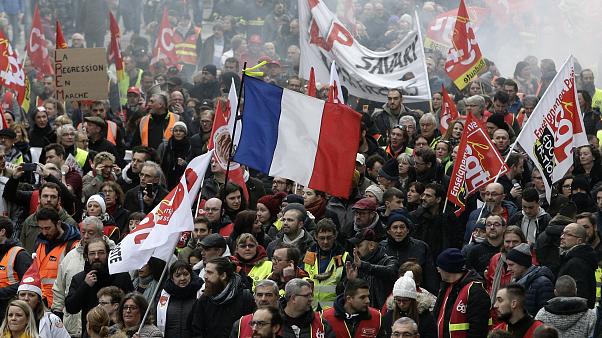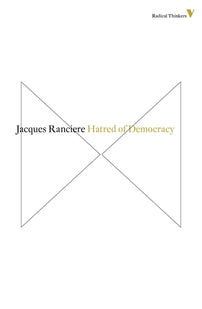Jacques Rancière: The crisis of democracy
What are the roots of the current crisis of democracy? How should we understand the simultaneity of contemporary revolts? Fifteen years after the publication of his book Hatred of Democracy, Jacques Rancière returns to its themes.

Jacques Rancière interviewed by Joseph Confavreux
Fifteen years after the publication of your Hatred of Democracy (Verso, 2005), what has happened to the ideological mutation you were describing then?
Jacques Rancière: The themes of the ‘republican’ intellectual discourse that I analysed at that time have spread widely, particularly fuelling an update of the far right, which saw an interest in recycling traditional racist arguments as a defence of republican and secular ideals. They have also served as justification for a number of measures restricting freedoms, such as those banning certain forms of clothing and demanding each and every one of us to present a bare face to the state’s inspection.
It can be said that these themes have both extended their sway and shown more clearly their obedience to the dominant powers. Intellectual hatred of democracy has increasingly emerged as simply an ideological accompaniment to the dizzying development of inequalities of all kinds and the increase in police power over individuals.
[book-strip index="1" style="buy"]Does the term ‘populism’, in its pejorative use, now constitute the main face of this hatred of democracy that claims to defend democratic government, while actually hindering democratic civilization?
Populism is not the name of a political form, it’s the name of an interpretation. The use of this word suggests that the forms of strengthening and personalization of state power that can be found all over the world are the expression of a desire coming from the people, understood as all the underprivileged classes. It is always the same big trick to say that, if our states are increasingly authoritarian and our societies increasingly unequal, this is because of the pressure exerted by the poorest, who are of course the most ignorant and, as good primitives, want leaders, authority, exclusion, etc. It is as if Trump, Salvini, Bolsonaro, Kaczyński, Orbán and their like were the emanation of a suffering people in revolt against the elites. In fact, they are the direct expression of the economic oligarchy, the political class, conservative social forces and authoritarian institutions (army, police, churches).
Certainly, this oligarchy is also based on the various forms of superiority that our society leaves those it inferiorizes (workers over unemployed, whites over coloured, men over women, inhabitants of the deep provinces over the light spirits of the metropolises, ‘normal’ people over the abnormal, etc.). But that is no reason to turn things upside down: the authoritarian, corrupt and criminal powers that now dominate the world do so above all with the support of the wealthy and the notable, not with that of the underprivileged.
What do you think of the concern expressed by many about the fragility of existing democratic institutions, and the many books announcing the end or death of democracies?
I do not read catastrophist literature too much and I like Spinoza’s view that the prophets were all the better placed to predict disasters because they were themselves responsible for them. Those who warn us about the ‘fragility of democratic institutions’ deliberately contribute to the confusion that weakens the democratic idea. Our institutions are not democratic. They are representative, therefore oligarchic. Classical political theory is clear on this, even if our rulers and their ideologies have tried to confuse everything. Representative institutions are by definition unstable. They can leave some space for the action of democratic forces – as was the case with parliamentary regimes in the days of industrial capitalism – or they can tend towards a monarchical system. It is clear that the latter is the dominant trend today.
[book-strip index="2" style="display"]This is particularly the case in France, where the Fifth Republic was designed to place institutions at the service of an individual, and where parliamentary life is fully integrated into a state apparatus itself entirely subject to the power of national and international capitalism, prepared of course to encourage the development of electoral forces that claim to be the ‘true’ representatives of the ‘true’ people.
To speak of the threats to ‘our democracies’ then has a very specific meaning: it means blaming the democratic idea for the instability of the representative system, saying that if this system is threatened, it is because it is too democratic, too subject to the uncontrolled instincts of the ignorant mass. All this literature ultimately supports the staged comedy of the second round of the presidential election, where the ‘lucid’ left closes ranks behind the candidate of the financial oligarchy, the only bulwark of ‘reasonable’ democracy against the candidate of ‘illiberal democracy’.
Critiques of the unlimited desires of individuals in modern mass society have increased. Why is this? How do you explain that these critiques can be found from all parts of the political spectrum? Are Marion Maréchal-Le Pen and Jean-Claude Michéa saying the same thing?
There is an invariant hard core that feeds more or less right and left versions alike. This hard core was first forged by nineteenth-century conservative politicians and reactionary ideologues, who warned of the dangers of a society where the consumption capacities and appetites of the poor were developing dangerously and would seriously threaten the social order. This is the big trick of reactionary discourse: to alert against the effects of a phenomenon so as to impose the idea that it exists: that the poor, in short, are too rich.
This hard core has recently been re-developed ‘on the left’ by so-called republican ideology, forged by intellectuals who hold a grudge against the working class that they had placed all their hopes in but was now dissolving. The great stroke of genius was to interpret the destruction of collective forms of labour ordered by financial capital as the expression of a ‘democratic mass individualism’ originating from the very heart of our societies and borne by those whose forms of work and life were destroyed.
From then on, all the forms of life ordered by capitalist domination could be reinterpreted as effects of a single evil – individualism – to which two synonyms could be given, depending on one’s mood: you could call it ‘democracy’ and campaign against the ravages of egalitarianism; you could call it ‘liberalism’ and denounce the hand of ‘capital’. But you could also make the two things equivalent, and identify capitalism with the unleashing of the consumer appetites of the poor.
This is the advantage of giving the name ‘liberalism’ to the absolutized – and, moreover, perfectly authoritarian – capitalism that governs us: the effects of a system of domination are identified with the life forms of individuals. It is then possible to join hands with the most reactionary religious forces and attribute the state of our societies to the freedom of morals embodied in medically assisted procreation and homosexual marriage, or use a pure and firm revolutionary ideal to hold petty-bourgeois individualism responsible for the destruction of collective forms of action and workers’ ideals.
What can be done in a situation where the denunciation of a democratic facade whose laws and institutions are often only the appearances beneath which the power of the ruling classes is exercised, and where there is disenchantment with representative democracies that have broken with any idea of equality, makes space for characters like Bolsonaro or Trump, who further increase inequality, hierarchies and authoritarianism?
What is needed first of all is to undo the traditional confusions that serve both the dominant order and the laziness of its so-called critics. In particular, we must put an end to this doctrine inherited from Marx which, in the guise of denouncing the appearances of ‘bourgeois’ democracy, actually validates the identification of democracy with the representative system. The reality of the power of the ruling classes is not exercised behind the mask of a democratic façade. Our representative institutions are direct instruments of this power.
The case of the Brussels Commission and its place in the European ‘Constitution’ should be enough to clarify matters. This is the very definition of a supranational representative institution where the notion of representation is completely dissociated from any idea of popular suffrage. The treaty does not even say by whom these representatives should be chosen. We know, of course, that it is states that designate them, also that they are mostly former or future representatives of the investment banks that dominate the world. And a simple glance at the ring of corporate headquarters that surrounds the Brussels institutions makes quite unnecessary the art of those who seek to show us an economic domination hidden behind representative institutions.
Once again, Trump could hardly be mistaken for a representative of the lost people of deep America, and Bolsonaro was directly enthroned by the representatives of the financial community. The first task is to escape the confusion between democracy and representation, and all the confusing notions derived from it – such as ‘representative democracy’, ‘populism’, ‘illiberal democracy’, etc. Democratic institutions do not have to be protected against a ‘populist’ peril. They have to be created or re-created. And it is clear that, in the current situation, they can only be created as counter-institutions, autonomous from government institutions.
Is hatred of democracy comparable when it takes the form of the dictatorial nostalgia of a Bolsonaro or the good-natured appearance of a Jean-Claude Junker explaining that there can be ‘no democratic choice against European treaties’? In other words, should we and can we prioritize and distinguish the threats to democracy, or is the difference between the extreme authoritarian right-wing extremists and capitalist technocrats ready to violently repress their peoples only a matter of degree and not kind?
There is every nuance that you like between its various forms. It can rely on forces nostalgic for yesterday’s dictatorships, from Mussolini or Franco to Pinochet or Geisel. It can even, as in some East European countries, combine the traditions of ‘communist’ dictatorships with those of ecclesiastical hierarchies. It can more simply be identified with the essential requirements of economic rigour, embodied by the Brussels technocrats. But there is always a common core.
Juncker is not Pinochet. But we have recently been reminded how the ‘neoliberal’ powers that govern in Chile do so within the framework of a constitution inherited from Pinochet. The pressure exerted by the European Commission on the Greek government is not the same as the dictatorship of the colonels. But it turned out that the ‘left-wing populist’ government, specially elected in Greece to resist this pressure, was unable to do so.
In Greece as in Chile, as in most parts of the world, it has become clear that resistance to oligarchies comes only from forces that are autonomous from the representative system and the so-called left-wing parties that are integrated into it. These parties reason within the logic of choosing the lesser evil. They are subject to break-up after break-up. One would be tempted to rejoice if this ongoing debacle did not have the effect of increasing the power of the oligarchy and making it more difficult for those who really seek to oppose it.
How do you view this autumn’s global fires? Can we identify common causes and motives in the different revolts that are taking place on several continents? Compared to the ‘square’ movements, which demanded a real democracy, these revolts are more based on socio-economic motivations. Does it say anything new about the state of the planet?
The democratic demand of the Hong Kong demonstrators gives the lie to such a development. In any case, we must move away from the traditional opposition between socio-economic motivations (deemed solid but petty) and aspirations for real democracy (nobler but evanescent). There is a single system of domination that is exercised by financial power and by state power. And the ‘squares’ movements drew their power precisely from a refusal to distinguish between limited demands and unlimited democratic affirmation. It is rare for a movement to start with a demand for democracy. They often start with a complaint against a particular aspect or effect of a global system of domination (electoral rigging, the suicide of a victim of police brutality, a labour law, an increase in the price of transport or fuel, even a project to destroy a public park).
When collective protest develops in the streets and occupied squares, it becomes not simply a demand for democracy addressed to the disputed power but an affirmation of democracy effectively implemented (democracia real ya). What it says is essentially two things: first, politics is increasingly taking the form of a conflict of worlds – a world governed by unequal law against a world built by egalitarian action – where the very distinction between economy and politics tends to fade away; second, parties and organizations once interested in democracy and equality have lost all initiative and capacity for action on this ground, which is now occupied only by collective forces born of the event itself. People can always repeat that it lacks organization. But what are the famous organizations doing?
Does a certain form of routinization of uprising on a global scale represent an important counter-movement?
I don’t really like the word routinization. Taking to the streets in Tehran, Hong Kong or Jakarta these days is really not routine. It can only be said that the forms of protest tend to be similar, against different but converging government systems that seek to secure the profits of the privileged at the expense of increasingly impoverished, despised and repressed sectors of the population. We can also see that they have achieved, particularly in Chile or Hong Kong, successes whose immediate future we do not know, but which clearly signal something quite different from simple ritual reactions of despair when faced with an irremovable order of things.
Fifteen years ago, the prospect of ecological disaster was less significant. Does the new ecological question transform the democratic question in the sense that some people argue that the safeguarding of the planet cannot be achieved in a deliberative framework?
Our governments have been operating for some time now under the alibi of an impending crisis that prevents the world’s affairs from being entrusted to its ordinary inhabitants and requires that they be left to the care of crisis management specialists: in other words, to the financial and state powers that are responsible for or complicit in them. It is clear that the prospect of ecological disaster supports their arguments. But it is also clear that the claim of our states to be the only ones capable of addressing global issues is contradicted by their inability to take decisions, individually and collectively, commensurate with this challenge. The globalist claim therefore essentially serves to tell us either that this is too complicated a political issue for us, or that it is an issue that makes traditional political action obsolete. Understood in this way, the climate issue serves the tendency to absorb politics into policing.
On the other hand, there is the action of those who say that, since the issue concerns each and every one of us, it is also within the power of each person to deal with it. This is what movements like that at Notre-Dame-des-Landes have done, taking a very specific case to identify the pursuit of a specific concrete objective with the assertion of a power that each person has. Cancelling an airport project obviously does not solve the issue of global warming. But it shows in any case that it is impossible to separate ecological issues from the democratic issue understood as the exercise of effective egalitarian power.
In his latest book, Frédéric Lordon distances himself from what he calls an ‘anti-politics’, in particular a ‘politics restricted to intermittence’, claiming that this is simply a ‘redistribution of sensitivity’. What does this criticism suggest to you about some of your ways of defining politics?
I don’t want to get involved in personal controversies. I will therefore limit myself to highlighting a few points in what I have written that may not be clear to everyone. I did not say that politics only exists intermittently. I said that it was not a constitutive and permanent part of the life of societies, because politics is not only about state power, but about the idea and practice of each person’s power. This specific power exists only in addition and opposition to normal forms of exercising power. This does not mean that politics only exists in extraordinary moments of collective celebration, that nothing can be done in the meantime and that no organization or institutions are needed. There have always been and will always be organizations and institutions.
The question is what they organize and what they institute, what is the power they implement, the power of equality or the power of inequality. Egalitarian organizations and institutions are ones that develop this power common to all, which, in fact, rarely manifests itself in a pure state. In the current state of our societies, it is clear that they can only be counter-institutions and autonomous organizations in relation to a representative system that is no more than a springboard for state power.
It is easy to see how in the last two decades, almost everywhere in the world, the only mobilizations against the advances of financial power and state power have been made by movements that are described as ‘spontaneous’, although they have shown much greater concrete organizational capacities than those of recognized left-wing ‘organizations’ (though we should not forget that many of those who played a role in them were activists already formed through practices of struggle on the ground). It is true that it is very difficult to maintain this common power over time. This requires creating a different time, a time made up of autonomous projects and actions, no longer punctuated by the calendar of the state machine. But we can only develop what exists. We can only build over time on actions that have actually changed, however little and briefly, the scope of what is possible.
Translated by David Fernbach
Mediapart, 2 December 2019







